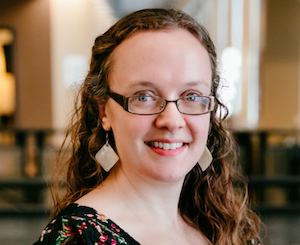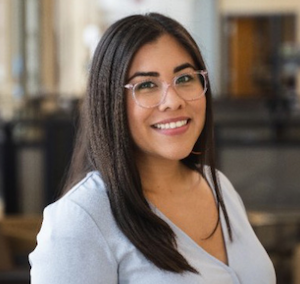“I Want to Say the Right Thing:” Developing Translingual Literacy Practices Through Early Care Educator and University Researcher Partnerships
by Angie Zapata, Mary Adu-Gyamfi, and Adrianna González Ybarra
A collaborative inquiry model of teacher learning offers a distinct departure from common top-down models of early care education teacher development. In the context of the teacher and researcher collaborative inquiry model presented in this paper, we encountered an intergenerational collective of early care educators (ECEs) and university partners as they mentored one another through classroom critical encounters with translingual picturebooks and took turns holding and loving their babies during after school gatherings. The learning was enlivened not only by talk, laughter, food, and reflections of instruction, but also was animated by the vibrant colors of the translingual picturebooks that flooded the room and served as essential socio-political art to read, discuss, and inform teaching. Entering this space of professional learning committed to collaborative inquiry and equity-focused instruction often elicited astonishment from those accustomed to tidy rows of teachers silently taking notes as a one-time speaker read from slides. At first glance, you might have been unsure who the “leader” or “expert” was, because everyone was participating in the discussion.
As predominantly White ECE teachers and predominantly Black and Brown university researchers, we turned to collaborative inquiry as an innovative and collaborative model of professional learning. In this essay, we feature the experience of Tamara, a White, middle-class teacher (all names are pseudonyms) in a midwestern rural suburban early childhood classroom. Nagasawa and colleagues (2023) note that “by humanizing these issues, our aim is to show that possibilities exist, even with difficulties and within complexities” (p. 170). By featuring Tamara’s experience to highlight the critical components of a collaborative inquiry model, we locate ECE professional development within the historical systems and socio-political issues shaping early care education and highlight how White, female teachers (the predominant ECE workforce demographic in the US) experience and take up professional learning that centers equity in racially, linguistically, and ethnically (RLE) complex classrooms. By identifying the critical components of a collaborative inquiry model in this way, we also offer direct implications for ECE learning, research, and practice.
 Angie Zapata, associate professor of Language and Literacies Education at the University of Missouri, is a longtime teacher, teacher educator, and researcher. Through collaborative inquiry partnerships with practicing and in-service PK-12 teachers. Her research publications highlight classroom experiences featuring picture books with diverse racial, linguistic, and ethnic representation, and how/what translingual and trans-modal literacies are produced in these moments. Dr. Zapata’s research is guided by her experiences growing up bilingual in Texas as a daughter of immigrant parents from Perú, and deep commitments to center anti-oppressive and justice-oriented language and literacies experiences in the classroom that nurture more inclusive schooling experiences for racialized bilingual/multilingual/multidialectal children and youth.
Angie Zapata, associate professor of Language and Literacies Education at the University of Missouri, is a longtime teacher, teacher educator, and researcher. Through collaborative inquiry partnerships with practicing and in-service PK-12 teachers. Her research publications highlight classroom experiences featuring picture books with diverse racial, linguistic, and ethnic representation, and how/what translingual and trans-modal literacies are produced in these moments. Dr. Zapata’s research is guided by her experiences growing up bilingual in Texas as a daughter of immigrant parents from Perú, and deep commitments to center anti-oppressive and justice-oriented language and literacies experiences in the classroom that nurture more inclusive schooling experiences for racialized bilingual/multilingual/multidialectal children and youth.
 Mary Adu-Gyamfi, PhD, is an assistant professor of elementary education in Learning, Teaching, and Curriculum at the University of Missouri with specific interest in social studies education. Her research examines methods of racial literacies development among preservice and early career teachers as well as conversations around race/racism between teachers and elementary students.
Mary Adu-Gyamfi, PhD, is an assistant professor of elementary education in Learning, Teaching, and Curriculum at the University of Missouri with specific interest in social studies education. Her research examines methods of racial literacies development among preservice and early career teachers as well as conversations around race/racism between teachers and elementary students.
 Adrianna Ybarra González is a doctoral candidate at the University of Missouri (MU) in the Language and Literacies for Social Transformation program. She is a Gus T. Ridgel and Sharon Adair Cinelli Fellow at MU. Adrianna’s research interests include working with and alongside Black, Indigenous preservice teachers of color. Her educational training in Ethnic Studies guides her research practices and frameworks. Theoretically, she draws upon critical race theories and women of color feminisms, and methodologically, she utilizes decolonial methodologies and testimonio to story their lived experiences, meaning-making processes, and language and literacy practices.
Adrianna Ybarra González is a doctoral candidate at the University of Missouri (MU) in the Language and Literacies for Social Transformation program. She is a Gus T. Ridgel and Sharon Adair Cinelli Fellow at MU. Adrianna’s research interests include working with and alongside Black, Indigenous preservice teachers of color. Her educational training in Ethnic Studies guides her research practices and frameworks. Theoretically, she draws upon critical race theories and women of color feminisms, and methodologically, she utilizes decolonial methodologies and testimonio to story their lived experiences, meaning-making processes, and language and literacy practices.